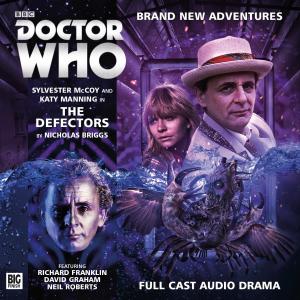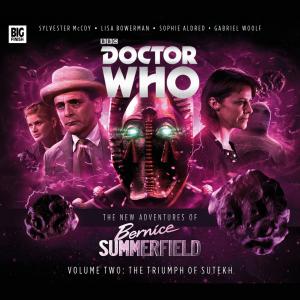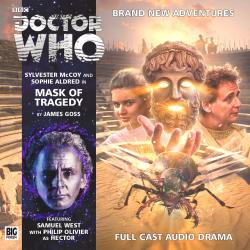
Written and directed by Nick Briggs
Big Finish Productions, 2015
Stars: Sylvester McCoy (The Doctor), Katy Manning (Jo Grant), Richard Franklin (Captain Mike Yates), Barnaby Edwards (Commander Wingford), Neil Roberts (Captain Cornelius), Rachel Bavidge and Jez Fielder (the Europans)
“I kept trying to think what my Doctor would have done ...”
“I am your Doctor, Jo – just with the benefits of a few more centuries’ wisdom ...”
Jo Grant and the Seventh Doctor, The Defectors
The Defectors is the first instalment in a trilogy that culminates in (and marks) the impending 200th release of Big Finish’s Doctor Who “main range”* later this month. It has been described (with tongue firmly in cheek by Big Finish) as the “locum Doctors” trilogy, as each story transplants some of the Doctor’s later regenerations into the respective eras of his first three incarnations.
In The Defectors, the Seventh Doctor (Sylvester McCoy) finds himself deposited at UNIT headquarters during the Third Doctor’s era, much to the surprise of companion Jo Grant (Katy Manning). Indeed, the Time Lord can barely reflect on how he suddenly came to be at this point in his past before he and Jo are whisked off to a remote island in the North Sea by regulars in the British Army who have, in the “interests of national security”, had all UNIT personnel despatched to London, including Captain Mike Yates (Richard Franklin) who is standing in for Brigadier Lethbridge-Stewart whilst he is in Geneva.
In the ensuing events, the Seventh Doctor and Jo uncover a near three decades-old conspiracy and the Doctor is presented with an agonising moral dilemma that may (or may not) explain why he has been relocated to this point in his timeline. Is he supposed to rectify something he did long ago or sanction a course of action which his third incarnation would have vociferously opposed?
Writer/director Nicholas Briggs delivers a very good script which seeks to capture the spirit of the Pertwee era whilst offering a twist on the usual “alien invasion/base under siege” style of storytelling. Briggs’ brief is challenging, as he has to deliver what is nominally a UNIT tale without that era’s key players – Nicholas Courtney (Brigadier Lethbridge-Stewart) has sadly departed and John Levene (Sergeant Benton) declined to appear, effectively robbing Briggs of two-thirds of the UNIT staff before he had even put pen to paper. As a result, UNIT is relegated to the sidelines, and the Doctor and Jo must rely on their wits to uncover the truth on Delphin Isle. The Defectors therefore has the undercurrents of classic Pertwee and McCoy TV serials The Sea Devils and The Curse of Fenric respectively. Both serials are set in seaside locations and the respective Doctor/companion combinations have the assistance (or hindrance) of the armed forces, but the perceived threat in The Defectors is not nearly as cut and dried.
Indeed, there is good reason to sympathise with the motives of the antagonistic Europans (Rachel Bavidge and Jez Fielder) and to be suspicious of Delphin Isle’s populace, represented by the slippery Commander Wingford and Captain Cornelius (portrayed by BF regulars Barnaby Edwards and Neil Roberts) – in spite of the alien influence pervading their community. Indeed, Briggs channels Pertwee era scribe Malcolm Hulke by showing that the token monsters aren’t as monstrous as they appear and that their victims – the so-called “defectors” of the tale – aren’t so innocent either. Unfortunately, Briggs cannot emulate Hulke’s flair for irony and tragedy. If Hulke had written this script, I think he would have put an entirely different complexion on the climax. Briggs, in contrast, rather neatly winds up the story in exactly the manner that you would expect of a Pertwee era serial. So, yes, while Briggs remains true to the essence of his brief, The Defectors lacks the pathos that Hulke (or perhaps his peers like Barry Letts or Terrance Dicks) would have instilled in the closing proceedings and gives the tale an almost upbeat ending that it probably doesn’t deserve.
As you would expect of a BF Doctor Who audio, The Defectors benefits from excellent sound production and top-rate performances. Sylvester McCoy continues to be excellent as the Seventh Doctor, injecting the right amounts of humour, assurance and steel into his character as the script demands. What isn’t in play here (which is great for the script and the character) is the Seventh Doctor’s proclivity for playing cosmic chess with his adversaries and his friends. Indeed, the mystery of how and why he has been brought to this earlier point in his personal history is not even properly considered until the serial’s fourth episode; this particular version of the Doctor is uncharacteristically as much in the dark as Jo Grant and the listeners are. Indeed, he remains relatively unflustered by this turn of events, concentrating instead on the mystery of Delphin Isle; it is only as the stakes soar that the Seventh Doctor questions his place and also the intended course of his actions.
Katy Manning is fantastic as Jo Grant, having only had the opportunity to portray the character previously in BF’s The Companion Chronicles without the advantages of a full cast audio drama. Although you can occasionally detect the age in her voice (she is, after all, a near septuagenarian playing a character in her mid-twenties!), Manning still manages to recapture the qualities that make Jo so fondly remembered to this day: her naivety, compassion, courage and impetuousness. Briggs shows he has a very good handle for Jo’s character and that’s she not just a “dolly bird” assistant; she makes some critical discoveries through her own detective work, aided by Doctor Who veteran David Graham’s befuddled character Shedgerton. Manning’s scenes with Shedgerton are also illustrative of the rapport Jo could quickly develop with supporting characters, and how she could bring out the best in those people.
Jo’s reaction to the “new” Doctor is also an intriguing part of the story, even though she is cut off from him for almost a good half of the serial. She is familiar with regeneration (this story, for her, occurring not long after the events of The Three Doctors) but she is nevertheless uncertain how much she should trust this stranger claiming to be the Doctor. At first, her accidental acknowledgments of this man as the Doctor is a frequent source of humour – both with the Seventh Doctor himself and the listener alike – but by the climax, Jo’s faith in the Time Lord is unfailing – to a fault. Like her attempt at self-sacrifice in The Daemons or Ace’s conviction in the Doctor in The Curse of Fenric, Jo’s belief proves to be critical ...
McCoy and Manning eclipse the play’s other performers. Franklin is underused as Yates but makes the most of his limited role. Edwards and Roberts are unconvincing villains, although you get the impression their caricatures of old school soldiers is a deliberate feature of Briggs’ writing. Graham is surprisingly convincing as the constantly bewildered, yet courageous Shedgerton (his reaction when he is introduced to the interior of the TARDIS gives off the impression it is the least of all the uncertainty he’s had to deal with!). Hackneyed accents aside, Bavidge and Fielder are also proficient as two of the lsle’s local publicans as well as the alien antagonists.
Indeed, if there is one disappointing aspect of the sound effects, it is the Europans’ voices. The aliens sound too often like wounded 1960s Cybermen or 1970s Silurians and their voices are so high pitched and heavily modulated that they are at times almost inaudible. You either have to play back the tracks on the serial to understand what they are saying or listen to the story multiple times to improve your understanding of their dialogue. Perhaps the voices are also an attempt by Briggs to recapture the style of alien tones frequently tried during the Pertwee era – the quality of sounds used back then were experimental and on repeat viewings today can still grate with the audience because the dialogue is hard to understand. When sound is so integral to BF’s output, it’s ludicrous to compromise the story out of affection for archaic sound techniques which are incomprehensible to the listener.
Nevertheless, Joe Kramer’s sound design and incidental music does enough to evoke impressions of the era of Doctor Who in which this story is ostensibly set while also providing some stirring and exciting passages of music. Although I’m a great admirer of film and TV soundtracks, I don’t often notice incidental music on BF audios largely because I’m focusing on plot and characterisation while listening. However, for The Defectors, I did notice and enjoy the music. Some of the cues Kramer uses – particularly for the lighter moments that exploit Jo’s accidental acknowledgements of the Doctor – are reminiscent of the humorous cues that Dudley Simpson employed in the Pertwee era. But there are also tracks in the story that are grander and more ambitious than what Simpson or his contemporaries in the BBC’s Radiophonic Workshop could have attempted. Kramer’s passage of music when UNIT helicopters converge on Delphin Isle in the story’s climactic moments has an almost cinematic tone, daresay of the likes of Apocalypse Now. It just illustrates how far along music has come in 50 years; compositions that would have taken Simpson or the Radiophonic Workshop weeks to develop on what was then considered state of the art equipment can probably be replicated on Big Finish’s studio facilities in a matter of minutes.
The Defectors is a solid start to the “locum Doctors” trilogy and a fun, entertaining and well thought out morality tale in its own right. By the end of the serial, we are no clearer about why the Doctor has been drawn back earlier into his time stream or who or what has perpetrated it. No doubt more clues will be laid in the next instalment Last of the Cybermen and answered in “200th” release The Secret History*, with Colin Baker and Peter Davison respectively. If The Defectors is any guide, then these instalments should be just as entertaining.
* Author’s note: BF’s Doctor Who output over the last 16 years truly exceeds 200 releases, considering the “main range” does not encompass the Fourth and Eighth Doctor adventures (whose output alone equates to an extra 100 titles), Companion Chronicles, Lost Stories and numerous Whoniverse spin-offs, eg Gallifrey, Jago & Litefoot, Counter-Measures, Dalek Empire, Professor Bernice Summerfield, etc.










